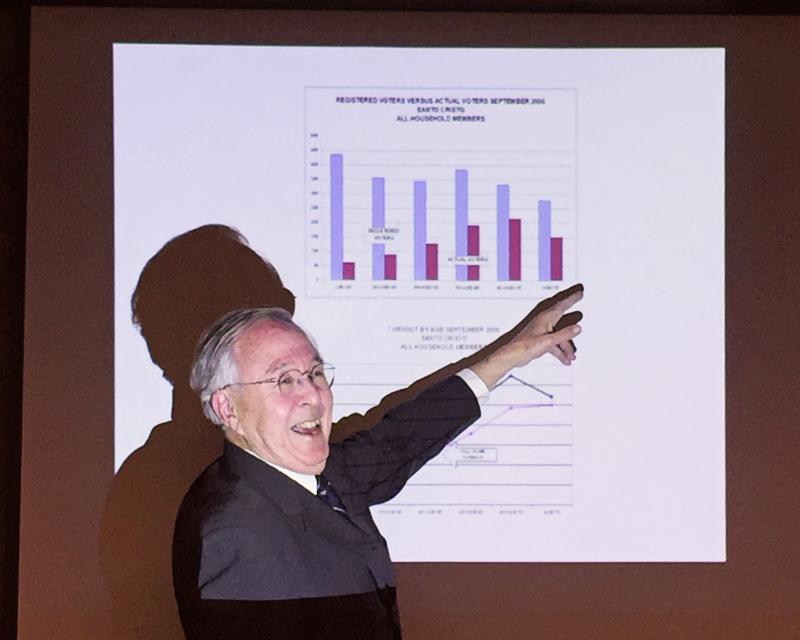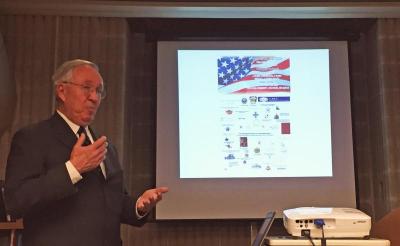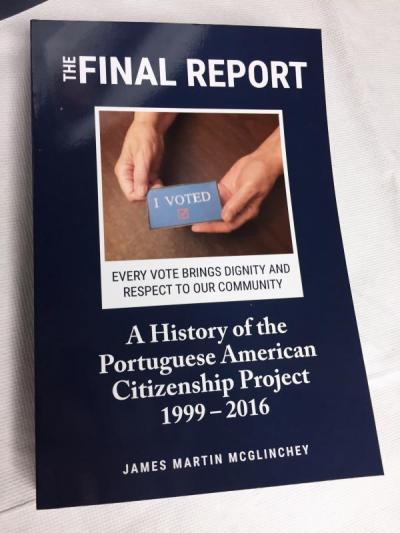A quiet celebration for Portuguese-American citizenship project
Underneath a corner of the Carney Library at UMass Dartmouth, more than a dozen people gathered, chatting about citizenship and community over coffee and cookies.
They were at the college’s Portuguese-American Archives on January 23 for a celebration: The launch of the Portuguese American Citizenship Project’s Final Report, written and presented by the project’s founding coordinator, James McGlinchey.
The Portuguese American Citizenship Project was a campaign to increase civic engagement — i.e., voting — among Portuguese-Americans that took place from 1999 through 2016.
“Basically, it was a civil rights campaign for Portuguese Americans,” McGlinchey explained. “It’s people themselves stopping themselves from voting.”
Although McGlinchey is a decidedly Irish name, the former economics professor’s maternal grandparents come from the Azores, and he spent time working in Lisbon with the US State Department.
McGlinchey got started on the project while working with the Luso-American Foundation, and conducted a survey of Portuguese-Americans in 1998.
“Each person interviewed said ‘The problem is that we are perceived as not participating in civic affairs.’ And the perception is reality,” he stated in his presentation.
He cited a pervasive figure among the community called the “50 percent rule.” According to this commonly held belief, 50 percent of Portuguese living in the US don’t become citizens; of those that do, 50 percent don’t register to vote; and of those that register, 50 percent don’t actually vote in elections.
“It’s a self-fulfilling prophecy,” McGlinchey said. “That becomes reality. If you’re a politician, even a Portuguese-American politician, you’re not going to waste time chasing 12 percent of the vote.”
So the project campaigned through clubs and churches to get more community members registered and interested in politics.
And in doing so, McGlinchey said, “The fifty percent rule goes out the window. It’s just not a fact. So you’re dispelling myths.”
He also stressed the fact that the project steered clear of partisan politics. “We didn’t stand for anything,” he said. “We didn’t take sides...That’s up to the person who casts the ballot.”
However, he did note that some people were against the project.
“We have had pushback by established Portuguese-American politicians, which was I must say completely unexpected,” he said. “But that makes perfect sense. They’re acting rationally...If you keep getting re-elected, why change?”
Donna Miranda of Fall River, who attended the talk, helped with the project as a church member and a union member. “It was a really successful project,” she said with a smile, adding that voting in her church went up from 40 percent to 70 percent thanks to the campaign.
The project ended in 2016. “It takes a lot of time and energy,” explained McGlinchey after the talk. “I put my body and soul into this thing...When you fight apathy, that’s the most frustrating thing.”
“We’re not selling books, we’re trying to sell ideas,” he said. “And we hope that people pick it up...The people that did this would be more than happy to help. But it now falls to a new generation.”
McGlinchey added that the lessons learned from the project could be applied to any community in the country.
“You can get a group of left-handed people,” he joked. “It can be done by virtually anybody. It’s quite simple. But they have to care.”
More information on the Portuguese American Citizenship Project can be found at portugueseamerican.org.














